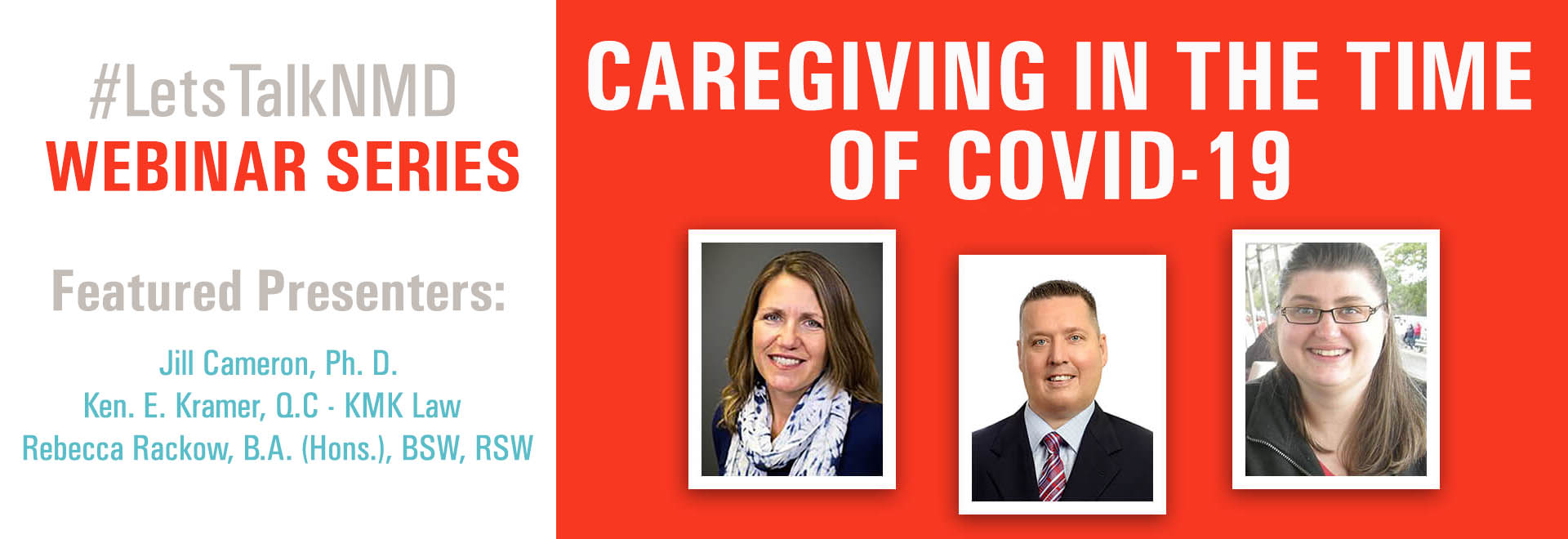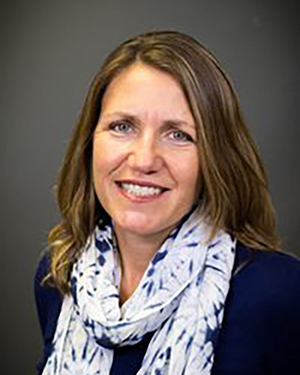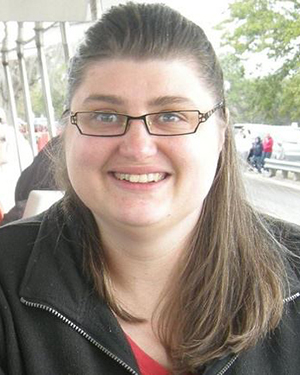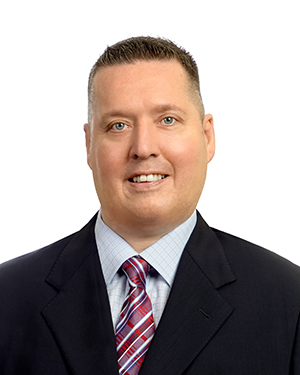
Caregiving In The Time of COVID-19
Learning Objectives
- Learn how to navigate the home healthcare system and receive the personal care supports you need in your home in a safe and consistent manner.
- Learn how to protect and take care of yourself and others in your home when caregiving in isolation.
- Learn about practical communication and coping strategies.
- Learn from other family members and caregivers in the neuromuscular disorders community by sharing and asking questions.
Presenters
JILL CAMERON, Ph.D.
 Rehabilitation Sciences Institute in the Faculty of Medicine at the University of Toronto (Ontario): Dr. Jill Cameron is an Associate Professor and Vice Chair Research in the Department of Occupational Science and Occupational Therapy and Rehabilitation Sciences Institute in the Faculty of Medicine at the University of Toronto, and an Affiliate Scientist at Toronto Rehabilitation Institute – UHN. She has held Ministry of Health, Ministry of Research and Innovation, and Canadian Institutes of Health Research New Investigator Awards. Her primary research interest is to understand the experiences and needs of family members who assume the role of informal caregiver for individuals with disability. Dr. Cameron aims to develop timely and relevant programs to assist them with their care-giving activities and pursuit of other valued activities and interests.
Rehabilitation Sciences Institute in the Faculty of Medicine at the University of Toronto (Ontario): Dr. Jill Cameron is an Associate Professor and Vice Chair Research in the Department of Occupational Science and Occupational Therapy and Rehabilitation Sciences Institute in the Faculty of Medicine at the University of Toronto, and an Affiliate Scientist at Toronto Rehabilitation Institute – UHN. She has held Ministry of Health, Ministry of Research and Innovation, and Canadian Institutes of Health Research New Investigator Awards. Her primary research interest is to understand the experiences and needs of family members who assume the role of informal caregiver for individuals with disability. Dr. Cameron aims to develop timely and relevant programs to assist them with their care-giving activities and pursuit of other valued activities and interests.
REBECCA RACKOW, B.A. (Hons.), BSW, RSW
 Canadian Mental Health Association (Saskatchewan): Rebecca Rackow is the Director of Advocacy, Research and Public Policy Development at the Canadian Mental Health Association Saskatchewan Division (CMHA-SK). Rebecca received a B.A. honours in psychology and is a Registered Social Worker with a strong interest in collaborative research. For over 20 years, she has worked as a caregiver with seniors, youth in care, children in a daycare setting and provided respite for foster parents. Rebecca developed a mental wellness program for caregivers through CMHA-SK called Caregiver Affected Recovery Education.
Canadian Mental Health Association (Saskatchewan): Rebecca Rackow is the Director of Advocacy, Research and Public Policy Development at the Canadian Mental Health Association Saskatchewan Division (CMHA-SK). Rebecca received a B.A. honours in psychology and is a Registered Social Worker with a strong interest in collaborative research. For over 20 years, she has worked as a caregiver with seniors, youth in care, children in a daycare setting and provided respite for foster parents. Rebecca developed a mental wellness program for caregivers through CMHA-SK called Caregiver Affected Recovery Education.
KEN M. KRAMER, Q.C – KMK Law (British Columbia)
 Ken M. Kramer is the founder and principal of KMK Law, a law firm in downtown Vancouver, BC, providing specialized legal services in the areas of Estates, Trusts, Administration, Elder Law, and Estate Litigation and Mediation for the past 25 years. Ken has a unique understanding of the disability community combined with his expertise in the area of estates and trusts law to serve families with disabilities. He is extremely passionate and a strong advocate for home care supports. Ken’s diverse portfolio includes serving as a publicly appointed Board Member and Vice-Chair of the College of Chiropractors of BC, and as a founding Board Member of Technology for Living, a non-profit organization in British Columbia providing respiratory and technology supports to people with disabilities. He is also Past-Chairs of Muscular Dystrophy Canada, Seniors First BC, BC’s Elder Law Section of the Canadian Bar Association, and the Province of BC’s Emergency Medical Assistants Licensing Board.
Ken M. Kramer is the founder and principal of KMK Law, a law firm in downtown Vancouver, BC, providing specialized legal services in the areas of Estates, Trusts, Administration, Elder Law, and Estate Litigation and Mediation for the past 25 years. Ken has a unique understanding of the disability community combined with his expertise in the area of estates and trusts law to serve families with disabilities. He is extremely passionate and a strong advocate for home care supports. Ken’s diverse portfolio includes serving as a publicly appointed Board Member and Vice-Chair of the College of Chiropractors of BC, and as a founding Board Member of Technology for Living, a non-profit organization in British Columbia providing respiratory and technology supports to people with disabilities. He is also Past-Chairs of Muscular Dystrophy Canada, Seniors First BC, BC’s Elder Law Section of the Canadian Bar Association, and the Province of BC’s Emergency Medical Assistants Licensing Board.
Talk Takeaways
- Providing care to a person with a neuromuscular disorder may be rewarding, but there may also be challenges associated with the role which are often unrecognized. Tackling the responsibility of caring for someone, while simultaneously managing employment, other family members, household chores, self-care and a social life, is a balancing act which requires tangible, informational and emotional support.
- Feelings of loneliness and social isolation are common for caregivers, as the demands of caregiving can disrupt social activities and structures, but these feelings are amplified with the current physical distancing and social isolation measures in place. COVID-19 might increase mental strain and pressures for caregivers.
- When caregivers become immersed with the needs of others, they often forget to take into account their own physical and mental health. Self-care and self-compassion is critical. A 15-min break away from caregiving and routine help manage stress. Engage in at least 1 healthy activity that you enjoy and find relaxing.
- Precautions for caregivers of people with neuromuscular disorders:
- Be diligent with practicing hand washing, use hand sanitizer throughout the day;
- Keep environment clean – clean surfaces with water and disinfectant;
- Limit contacts outside the home or work environment;
- Identify back up support;
- Use and discard gloves and masks properly.
- Muscular Dystrophy Canada has a system navigation program with service specialists available to help people with neuromuscular disorders and their family members navigate complex systems, provide one on one support and provide education and resources. Contact the service specialist in your area.
